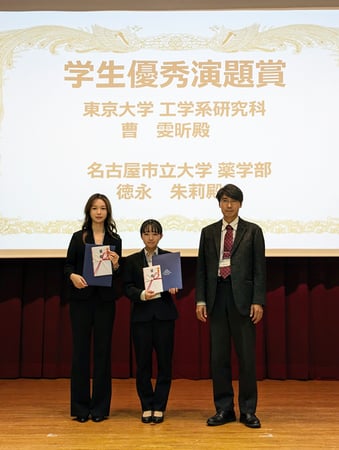Share this
On 29th November, Wenxin Cao (D2), Sakai-Nishikawa Lab, Department of Chemical System Engineering, received Excellence Award for Student Presentation at the 36th annual meeting of the Japanese Society for Alternatives to Animal Experiments.

Wenxin Cao is On the left
About awarded research
Title: An Artificial Mucus Barrier Involved in vitro Model that can Recapitulate the Long-term Host-microbe Interaction Between Various Types of Gut Microbiota and Epithelial Caco-2 cells
Gut microbiota is emerging as an underestimated factor regulating human health and disease, and the mucosa barrier that overlies the gut epithelium not only provides microbiota with colonizing environment, but also acts as the defense line against bacteria and other antigenic substances present in the lumen. In addition, many studies have reported that the abnormal mucosa barrier is generally associated with inflammatory bowel diseases. Therefore, a representative mucus barrier is necessary to study the host-microbe interaction in in vitro models.
In this research, we have achieved a stable in vitro model involving an artificial mucus layer, which was proved to exhibit desired barrier function to prevent epithelial cells from direct contact with bacteria species. In addition, the artificial mucus layer demonstrated good biocompatibility and had no significant impacts on cell activity and monolayer permeability with various thicknesses. Within this model, the interaction between Caco-2 monolayer and L. plantarum was recapitulated and the possible mechanism was analyzed and concluded. For the next step, we expect to use this artificial mucus layer involved in vitro model as a pathogenic model to study the underlying pathogenic mechanisms and identify potential therapeutics.
Your impression & future plan
I really appreciate the insightful comments and suggestions received during the presentation session, which were very inspiring for my future research. And I really appreciate all the support from our collaborator at Meiji Co., Ltd, and everyone at Sakai-Nishikawa Lab. During my doctoral courses I will optimize the aforementioned in vitro model and apply it to investigate pathogenic mechanisms and identify potential therapeutics for intestinal disorders. I wish my work can contribute to the progress of biomedical research and the betterment of human welfare in the future.
These Related Stories


